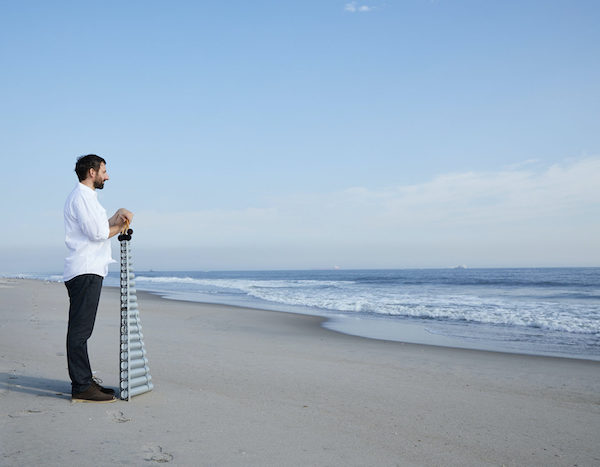Jan 13, 2026 2:09 PM
More Trump-Kennedy Center Cancellations
The fallout from the renaming of the John F. Kennedy Center for the Performing Arts to include President Donald…

Chris Dingman’s latest release began as a way to ease his father’s discomfort as he died.
(Photo: Zachary Maxwell Stertz)As Joe Dingman lay dying from a rare heart condition at home, his son decided to try and ease his father’s acute physical and mental pain.
Chris Dingman brought his vibraphone, some microphones and his laptop, set everything up in the basement directly beneath where his dad was resting, and began to play.
During two consecutive weekends, the vibraphonist recorded more than five hours of improvised solo music, something that ultimately brought peace and healing to Joe in his final days. Honoring his father’s request to have what was made for him become something that could help others, Chris Dingman released Peace, a collection of the improvisations, in June.
“I think it was kind of a dream of his to see it happen,” the younger Dingman said by phone from his home in Brooklyn.
According to his son, Joe was a warm, people-loving person who coached soccer and fed the homeless. He was a scientist, but loved music—mostly opera—and became an avid jazz fan when his son showed an affinity for it as a teenager. The two listened to records during dinner and together went to see shows, traveling to New York to visit the Village Vanguard and venturing out to Yoshi’s in Oakland, near their Bay Area home. Later, as Dingman became a well-known performer, Joe would be there at many of his performances, even flying to different cities around the country for some high-profile gigs.
The last time Dingman’s father saw him play was in Washington D.C. during 2018. He’d already received a terminal diagnosis, giving Joe about five years to live. But within a few months, he was in the ICU, fighting for his life. Doctors then predicted that he had just a few more days left. The shock of having his life cut even shorter left Joe buffeted by waves of anger and depression, adding to his physical aliment.
Somehow, Joe survived the next few days and was able to return home, where he was set up for hospice care. He and Carolyn, his wife of 49 years, had by then moved to Pennsylvania, which made it possible for their son to drive down from New York with his instrument in June of that year. Dingman had actually considered doing some community outreach by playing music for hospice patients, not realizing what was ahead for his father.
“I couldn’t see him, but I kind of knew where he was at,” Dingman remembered about the sound of his vibraphone resonating up the basement stairs, through the open door and into the living room where his dad could hear the music.
The nights were the toughest for his father, who at time had trouble breathing and often would wake in terror from a form of post-traumatic stress brought about by his time in the ICU. It was through those long nights when Dingman did the most playing for his father; the recordings of those moments allowed his father to listen to his son play whenever he needed to—day or night—for the remainder of his life.
The music is beautifully serene and unhurried—a few tracks pushing past 20 minutes, topping out at 45—each piece slowly unfolding and revealing a unique story.
“Because of the slower nature [of the songs],” Dingman explained, “it felt like composing on the spot. It took me some time to really hear in my mind and tap into what was coming up.”
It was the first time he had ever played like this, but in a way, it was an extension of a daily ritual he’s maintained for years: meditation.
“I didn’t consciously do it, but I think it sort of naturally happened—to bring that sort of meditative feeling into the music, to try to help bring that to my dad, to try to bring some peaceful energy for him,” Dingman said.

Belá Fleck during an interview with Fredrika Whitfield on CNN.
Jan 13, 2026 2:09 PM
The fallout from the renaming of the John F. Kennedy Center for the Performing Arts to include President Donald…

Peplowski first came to prominence in legacy swing bands, including the final iteration of the Benny Goodman Orchestra, before beginning a solo career in the late 1980s.
Feb 3, 2026 12:10 AM
Ken Peplowski, a clarinetist and tenor saxophonist who straddled the worlds of traditional and modern jazz, died Feb. 2…

The success of Oregon’s first album, 1971’s Music Of Another Present Era, allowed Towner to establish a solo career.
Jan 19, 2026 5:02 PM
Ralph Towner, a guitarist and composer who blended multiple genres, including jazz — and throughout them all remained…

Rico’s Anti-Microbial Instrument Swab
Jan 19, 2026 2:48 PM
With this year’s NAMM Show right around the corner, we can look forward to plenty of new and innovative instruments…

Richie Beirach was particularly renowned for his approach to chromatic harmony, which he used to improvise reharmonizations of originals and standards.
Jan 27, 2026 11:19 AM
Richie Beirach, a pianist and composer who channeled a knowledge of modern classical music into his jazz practice,…